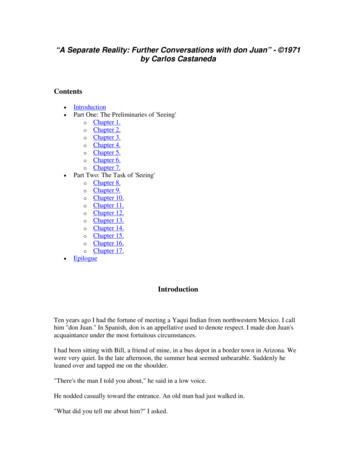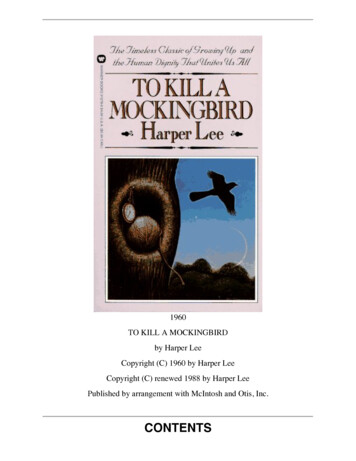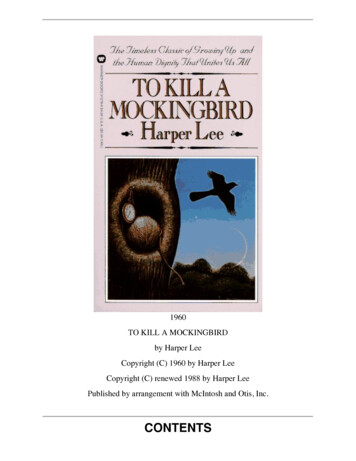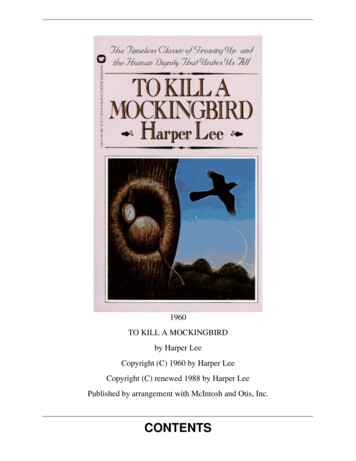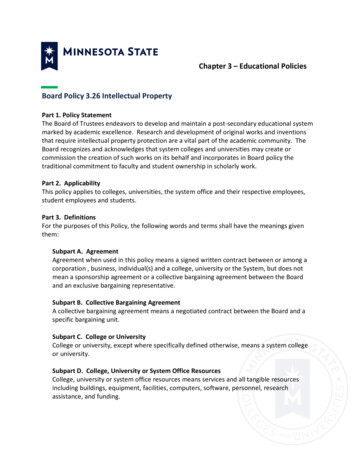
Transcription
Chapter 3 – Educational PoliciesBoard Policy 3.26 Intellectual PropertyPart 1. Policy StatementThe Board of Trustees endeavors to develop and maintain a post-secondary educational systemmarked by academic excellence. Research and development of original works and inventionsthat require intellectual property protection are a vital part of the academic community. TheBoard recognizes and acknowledges that system colleges and universities may create orcommission the creation of such works on its behalf and incorporates in Board policy thetraditional commitment to faculty and student ownership in scholarly work.Part 2. ApplicabilityThis policy applies to colleges, universities, the system office and their respective employees,student employees and students.Part 3. DefinitionsFor the purposes of this Policy, the following words and terms shall have the meanings giventhem:Subpart A. AgreementAgreement when used in this policy means a signed written contract between or among acorporation , business, individual(s) and a college, university or the System, but does notmean a sponsorship agreement or a collective bargaining agreement between the Boardand an exclusive bargaining representative.Subpart B. Collective Bargaining AgreementA collective bargaining agreement means a negotiated contract between the Board and aspecific bargaining unit.Subpart C. College or UniversityCollege or university, except where specifically defined otherwise, means a system collegeor university.Subpart D. College, University or System Office ResourcesCollege, university or system office resources means services and all tangible resourcesincluding buildings, equipment, facilities, computers, software, personnel, researchassistance, and funding.
Page 2Policy 3.26Subpart E. Course OutlineThe course outline is the document approved by the college or university curriculumcommittee and shall include the course title, course description, prerequisites, total credits,lecture/lab breakdown, and student learning outcomes. (As referenced in Board Policy 3.22Course Syllabi)Subpart F. Course SyllabusThe course syllabus is a document that contains the elements of the corresponding courseoutline, standards for evaluation of student learning, and additional information thatreflects the creative work of the faculty member. (As referenced in Board Policy 3.22Course Syllabi)Subpart G. Creator/InventorA creator is an individual or group of individuals who invent, author, discover, or areotherwise responsible for the creation of intellectual property. And inventor refers to thecreator of an invention that may be patentable.Subpart H. EmployeeAn employee is any person employed by the State of Minnesota as defined by PublicEmployees Labor Relations Act [PELRA].Subpart I. FacultyThe term “Faculty” refers to full-time and part-time employees performing work inbargaining units 209 and 210 and other employees who teach or conduct research with alevel of responsibility and self direction equivalent to that traditionally exercised andenjoyed by instructional unit employees when engaged in similar activities, e.g., thepreparation of research articles for peer review journals by Administrative and ServiceFaculty (ASF) members or graduate students.Subpart J. Intellectual PropertyIntellectual property is any work of authorship, invention, discovery, or other originalcreation that may be protected by copyright, patent, trademark, or other category of law.Subpart K. Intellectual Property RightsIntellectual Property Rights means all the protections afforded the owner or owners of anoriginal work under law, including all rights associated with patent, copyright, andtrademark registration.Subpart L. Jointly Created WorkA jointly created work is one where two or more creators contribute to the work and intendthat it result in a unified, single work.
Page 3Policy 3.26Subpart M. Minnesota State Colleges and Universities SystemThe public higher education system established at Minnesota Statutes Chapter 136F. TheSystem includes the Board of Trustees, the system office, the state colleges and universities,and any part or combination thereof.Subpart N. System OfficeSystem office means the central administrative office under the direction and supervision ofthe chancellor and which is part of the Minnesota State Colleges and Universities System.Subpart O. SponsorA sponsor is a person, private sector company, organization, or governmental entity, otherthan the System , that provides funding, equipment, or other support for a college,university, or the system office to carry out a specified project in research, training, orpublic service.Subpart P. Sponsorship AgreementA sponsorship agreement is a written agreement between the sponsor and a college,university, and/or the system office and may include other parties including the creator ofthe work.Subpart Q. StudentA student is an individual who was or is enrolled in a class or program at any system collegeor university at the time the intellectual property was created.Subpart R. Student EmployeeA student employee is a student who is paid by any system college, university, or thesystem office for services performed. Graduate assistants and work-study students arestudent-employees. For graduate students who teach, see Faculty definition in Subpart I.Subpart S. Substantial Use of ResourcesSubstantial use exists when resources are provided beyond the normal professional,technology, and technical support supplied by the college, university, and/or system officeto an individual or individuals for development of a project or program.Subpart T. SystemSee Minnesota State Colleges and Universities System definition in Part 3. Definitions,Subpart N of this policy.Subpart U. Works Made for HireWorks made for hire means all work done by an employee within the scope of his or heremployment or specially commissioned work.
Page 4Policy 3.26Part 4. Ownership of Intellectual Property RightsSubpart A. Basic Ownership Rights of the Various Types of Creative WorksThe ownership rights to a creation shall be determined generally by the provisions inSubpart A below, but ownership may be modified by an agreement, sponsorshipagreement, or other condition described in Subpart B or Subpart C below.1. Institutional Works. Intellectual property rights in institutional works belong to thecollege or university. Institutional works are works made for hire in the course andscope of employment by employees or by any person with the use of college oruniversity resources, unless the resources were available to the public without charge orthe creator had paid the requisite fee to utilize the resources. A course outline is aninstitutional work. A college, university or the system office may enter into a writtenagreement with a non-faculty employee granting the employee ownership of a workthat the parties agree is of a scholarly nature as described in Subpart A.2. For thepurposes of this policy, scholarly works are not considered institutional works.2. Scholarly Works. Intellectual property rights in scholarly works belong to the facultymember or student who created the work, unless an agreement, sponsorshipagreement, or other condition described in Subpart B or C below provides otherwise.Scholarly works are creations that reflect research, creativity, and/or academic effort.Scholarly works include course syllabi, instructional materials (such as textbooks andcourse materials), distance learning works, journal articles, research bulletins, lectures,monographs, plays, poems, literary works, works of art (whether pictorial, graphic,sculptural, or other artistic creation), computer software/programs, electronic works,sound recordings, musical compositions, and similar creations.3. Personal Works. Intellectual property rights in personal works belong to the creator ofthe work. A personal work is a work created by an employee or student outside his orher scope of employment and without the use of college or university resources otherthan resources that are available to the public or resources for which the creator haspaid the requisite fee to utilize.4. Student Works. a) Intellectual property rights in student works belong to the studentwho created the work. b) A creative work by a student to meet course requirementsusing college or university resources for which the student has paid tuition and fees toaccess courses/programs or using resources available to the public, is the property ofthe student. c) A work created by a student employee during the course and scope ofemployment is an institutional work and intellectual property rights to such creationbelong to the college or university unless an agreement, sponsorship agreement, orother condition described in Subpart B or C below provides otherwise.
Page 5Policy 3.26Subpart B. Modification of Basic Ownership RightsThe general provisions for ownership of intellectual property rights set forth in Subpart Amay be modified by the entering into a signed written agreement as provided in thissubpart, following collaborative discussion among the affected parties, or through thesubstantial use of resources.1. Sponsorship Agreement. The ownership of intellectual property rights in a work createdunder a sponsorship agreement shall be determined by the terms of the sponsorshipagreement. If the sponsorship agreement is silent on the issue of ownership ofintellectual property rights, ownership will be determined under applicable law.2. Collaborative Agreement. A college, university or the system may participate in projectswith persons, corporations, and businesses to meet identified student, citizen,community and industry needs. Ownership rights pursuant to any collaboration shall beaddressed pursuant to this policy.3. Specially Commissioned Work Agreements. Intellectual property rights to a workspecially ordered or commissioned by the college or university from a faculty memberor other employee, and identified by the college or university, as a speciallycommissioned work at the time the work was commissioned, is a work made for hireand shall belong to the college or university. The college or university, and the employeeshall enter into a written agreement for creation of the specially commissioned work.4. Substantial Use of Resources. In the event a college, university or the system officeprovides substantial resources to a faculty member for creation of a work that is not aninstitutional work created under a sponsorship agreement, individual agreement, orspecial commission, the college university and/or the system office and the creator shallown the intellectual property rights jointly in proportion to the respective contributionsmade. Use of resources is considered substantial when the additional support receivedis beyond the normal support level made available by a college, university and/or thesystem office to the individual in his or her position.Subpart C. Other ownership factors1. Collective Bargaining Agreement. In the event the provisions of this Policy and theprovisions of any effective collective bargaining agreement conflict, the collectivebargaining agreement shall take precedence.2. Jointly Created Works. Ownership of jointly created works shall be determined byseparately assessing which of the above categories applies to each creator, respectively.Jointly created works involving the contributions of students and/or student employeesmust be assessed considering this and other relevant categories of ownership rights asset forth above.
Page 6Policy 3.263. Sabbatical Works. Intellectual property created during a sabbatical is defined as ascholarly work. Typical sabbatical plans do not require the use of substantialcollege/university resources as defined in Part 2. Subpart S. of this policy. If the workcreated as part of an approved sabbatical plan requires resources beyond those normalfor a sabbatical, the parties may enter into one of the applicable arrangements as setforth in Part 4. Subparts B. and C. of this policy.4. System, College or University Name. Intellectual property rights associated with theSystem's identity, the identities of its colleges and universities, logos, and other indicesof identity belong to the respective entity. Such rights may be licensed pursuant toreasonable terms and conditions approved by the Chancellor, presidents or theirdesignees, respectively. System employees may identify themselves with such title oftheir position as is usual and customary in the academic community; but any user of theSystem's or a college’s or university’s name, logo, or indicia of identity shall takereasonable steps to avoid any confusing, misleading, or false impression of particularsponsorship or endorsement by the System, its colleges or universities. When necessary,specific disclaimers shall be included.5. Works Owned Jointly by Colleges, Universities and the System. Colleges, universitiesand system ownership interests in jointly owned intellectual property shall bedetermined by the relative contributions made by each contributor - unless otherwiseprovided in a written agreement. The ownership interests may be expressed inpercentages of ownership or an unbundling of the rights associated with the work,whatever the parties agree to. This paragraph applies only to allocation of ownershipinterests among a college, university or the System. The ownership of any other jointowner shall be determined in accordance with applicable policy, collective bargainingagreement, or personnel plan provisions, or as negotiated among the parties.6. Equitable Distributions. In any instance in which the System and/or its colleges oruniversities execute an agreement with an individual, corporation, business or otherentity for economic gain using intellectual property in which the colleges, universities,or the System has an ownership interest, the colleges, universities or the System shallreceive an equitable distribution. The proceeds of the equitable distribution shall beshared among the creators of the work as determined by agreement in accordance withthis policy.Part 5. Coordination FunctionSubpart A. Appointment of coordinator. The president or Chancellor, or his/her designee ateach college, university, or system office shall appoint an employee to be the localIntellectual Property Coordinator. The coordinator has responsibility to administerprovisions of this policy to include dissemination of the college or university's proceduresregarding implementation of Board Policy 3.26 Intellectual Property and Board Policy 3.27Copyrights and any related procedures.
Page 7Policy 3.26Subpart B. Record-keeping. Each college and university shall establish a record-keepingsystem to monitor the development and use of its intellectual property. Any questionsrelating to the applicability of this policy should be directed to the Intellectual PropertyCoordinator.Subpart C. Conflicts of interest and ethics. System employees are responsible for adheringto all legal and ethical requirements in accordance with State law, Board Policy and systemprocedure.Part 6. Preservation of Intellectual Property RightsSubpart A. Protection of Rights. A college, university or the system office shall undertakesuch efforts, as it deems necessary to preserve its rights in original works when it is a sole orjoint owner of the intellectual property rights. A college, university or the system officemay apply for a patent, trademark registration, copyright registration, or other protectionavailable by law on any new work in which the college, university or the system officemaintains intellectual property rights.Subpart B. Payment of Costs. A college, university or the system office may pay some or allcosts required for obtaining a patent, trademark, copyright, or other classification onoriginal works for which the college, university or the system office owns or jointly owns theintellectual property rights. If a college, university or the system office has intellectualproperty rights in a jointly owned work, the college, university or the system office mayenter into an agreement with joint owners relating to the payment of such costs.Part 7. Commercialization of Intellectual PropertySubpart A. Right of Commercialization. The college, university or the system office thatowns or has shared intellectual property rights to a work may commercialize the work usingits own resources or may enter into agreements with others to commercialize the work asauthorized by law. Upon request of a creator who retains intellectual property rights in awork, the college, university or the system office shall advise the creator of progress incommercializing the work.Subpart B. Sharing of Proceeds. An employee who creates a work and retains anintellectual property interest in such work in which the college, university or system officemaintains intellectual property rights is entitled to share in royalties, licenses, and any otherpayments from commercialization of the work in accordance with applicable collectivebargaining agreements, individual agreements, and applicable laws. All expenses incurredby the college or university in protecting and promoting the work, including costs incurredin seeking patent or copyright protection and reasonable costs of marketing the work, shallbe deducted and reimbursed to the college, university or the system office before thecreator is entitled to share in the proceeds.
Page 8Policy 3.26If a college, university or the system office decides not to pursue patent or copyrightprotection in a jointly owned work and the creator/inventor decides to pursue suchprotection, all expenses incurred by the creator/inventor in protecting and promoting thework including costs incurred in seeking patent or copyright protection and reasonablecosts of marketing the work, shall be deducted and reimbursed to the creator/inventorbefore the college, university or the system office is entitled to share in the proceeds.Net proceeds generated from the commercialization of works owned jointly by colleges,universities or the system office (not creators/inventors) will be distributed in accord withthe terms of a written agreement, or absent an agreement, in amounts equal to the relativecontributions made by the colleges, universities or the system office.Subpart C. Intellectual Property Account. Each college, university, and the system officeshall deposit all net proceeds from commercialization of intellectual property in its owngeneral intellectual property account. The President/Chancellor (or designee) may use theaccount to reimburse expenses related to creating or preserving the intellectual propertyrights of the college, university, or system office or for any other purpose authorized by lawand Board policy, including the development of intellectual property.Subpart D. Trademarks. Income earned from the licensing of college, university or Systemtrademarks and logos is not subject to the requirements of Subpart C for distribution offunds.Part 8. Assignment of RightsSubpart A. College, University or System Office Assignment. A college, university or thesystem office may assign all or a portion of its rights in a work to the creator, corporation,business or to any other person in accordance with the law and when in the best interestsof the college, university or the System. As a condition of the assignment, the college,university or the system office, may preserve rights, such as a royalty-free, perpetual,irrevocable, non-exclusive license to use and copy the work in accordance with thepreservation and the right to share in any proceeds from commercialization of the work.Subpart B. Creator Assignment. Any person may agree to assign some or all of his or herintellectual property rights to the college, university or System. The creator may preserveany rights available to the creator as part of the assignment.Subpart C. Assignment in Writing. Any assignment of intellectual property rights shall be inwriting and signed by the assignor and assignee.Part 9. Dispute Resolution ProcessThe system office may develop procedures to resolve disputes relating to this policy.
Page 9Policy 3.26Part 10. Notification of PolicyThe Intellectual Property Coordinator at each college, university, and the system office shallprovide a copy of this Intellectual Property Policy and any other forms developed to implement thisPolicy to persons upon request. The college, university, or system office shall arrange training on aperiodic basis for faculty, staff and/or other persons who are covered by this Intellectual PropertyPolicy.Date of Adoption:06/19/02Date of Implementation: 01/01/03Date of Last Review:Date and Subject of Amendments:11/16/11 - Effective 1/1/12, the Board of Trustees amends all board policies to change the term"Office of the Chancellor" to "system office," and to make necessary related grammaticalchanges.Additional HISTORY.
Intellectual property created during a sabbatical is defined as a scholarly work. Typical sabbatical plans do not require the use of substantial college/university resources as defined in Part 2. Subpart S. of this policy. If the work created as part of an approved sabbatical plan requires resources beyond those normal








